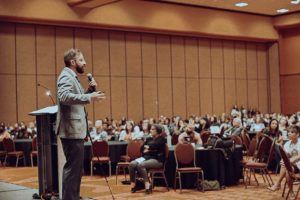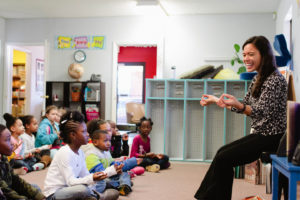Public Schools: Busily answering questions no one is asking
The survey responses of roughly 2,000 parents and staff of Omaha Public Schools distressingly reveals a problem plaguing the nation: people really don’t understand the purpose of public…

The survey responses of roughly 2,000 parents and staff of Omaha Public Schools distressingly reveals a problem plaguing the nation: people really don’t understand the purpose of public schools.
The Omaha survey was conducted at the behest of the school board in an attempt to identify the weaknesses in the district in the wake of Superintendent Cheryl Logan’s resignation and the board’s search for a replacement.
Logan, whose tenure was marked by a combative, dismissive attitude toward parents and other community members, oversaw the most rapid decline in academic achievement and attendance in OPS history, while simultaneously ushering in the most violent and destructive school environment ever seen in this city.
Perhaps unsurprisingly, the responses in the current survey indicated not only a lack of confidence in the outgoing administration, but more distressingly, a complete misapprehension on the part of both teachers and parents of the purpose of public schools.
Words like “disappointed” and “frustrated” topped the list of responses from participants asked to describe the district in a single word. These joined other negative replies, like “concerned,” “struggling” and “worried.”
However, there were a smattering of answers that indicated the respondent was either unaware of, or indifferent to, the plummeting test scores, the skyrocketing absenteeism and increasing violence among students in the district.
How else can one reconcile descriptors like “hopeful,” “positive” and “proud” with the daily reality that is driving teachers and other staff to seek out alternate career paths in record numbers, and leading parents to keep their children home for instruction, desperately trying to protect the next generation from the predatory climate that pervades much of mid-to-large city public education?
There are few things more frustrating than demanding answers to unanswerable questions. Asking an educator to explain your child’s dismal academic achievement when that educator has been focusing in class on almost anything other than academics, is bound to yield few answers and even less satisfaction.
Like the superfluous employee desperately trying to appear indispensable, establishment education – as represented by teachers’ unions – has justified their existence by answering questions no one has asked.
As Steely Dan once sang, “the things that pass for knowledge, I can’t understand.” That line, from their hit “Reelin’ in the years,” while intended as a dig against traditional education and society, actually serves to encapsulate the bait and switch inherent in a late 60’s and early 70’s college education. Parents sent their kids off to prestigious universities at great expense only to have them return as adversaries to their own families and saboteurs to society.
That subversive circumstance has since migrated downward through the grade levels as the graduates of those drug-hazed days pass on their “wisdom” to successive generations of once-innocent students and hire like-minded replacements for themselves as they move through the ranks.
Educational fads have so swamped this once-noble profession, that today, the plea to simply pursue academic excellence is mischaracterized by many as a right-wing, Christo-fascist demand.
The OPS survey aptly illuminates the deep chasm in the minds of parents, students, and teachers between what a school is, and what it ought to be.
It doesn’t require an advanced degree in data science to suspect the negative one-word descriptors of the district likely came from its long-suffering consumers – the parents of students ill-served by social emotional learning, critical race theory, and the near complete obliteration of behavioral standards.
Conversely, the idea that such an obvious train wreck as OPS can be described positively likely comes from those who are responsible for the train’s derailing.
This dynamic is by no means unique to Omaha, Nebraska. Indeed, this crap-show is playing to sold out crowds all across the fruited plain. As “big education” has grown increasingly hegemonic, its failings have tainted schools of all sizes, locations and populations.
Mind you, this is not a new premier on the stage of American scholasticism; this show is in its umpteenth run. We’re only now seeing it because the pandemic drew the curtain back, exposing the backstage machinations that have been there since John Dewey first made out with Karl Marx under the bleachers during Freshman football practice.
Anti-classicism suffused both men’s ideologies, each recognizing the necessity of destruction to stimulate new growth. To both Dewey and Marx, a new way had to overtake the old way, and this had to happen at the earliest age possible, and both saw public education as just the tool to do it.
Today, the idea of rows of children, reciting, learning, and studying a canon of knowledge bequeathed to them by their ancestors is as alien as a big city library without a drag queen story hour.
Teachers are attempting to play a role for students that belongs to a more important and influential character, the parent. Having made a complete mash of their profession, they are desperately trying to change their job description before anyone notices how far removed from usefulness they’ve become.
In this effort, they are encouraged and supported by their unions, administrative leadership and the myriad industries that rely on them for access to the vast pools of money we call a public-school budget.
The truth is not difficult to see – it’s far easier to propagandize than to educate, to “preach” than “teach” if you will. The latter requires a commitment to truth while the former is the closest possible friend of ignorance.
Parents, who are up to their necks in the responsibilities of daily life in the United States, have too long trusted the school as an able and sturdy stand in. With both parents often working (assuming there are two parents involved) the child lacks parenting, a void greedily filled by the ideologues of a fantasy world where children can be anything they choose, including the impossible.
If any lessons are to be drawn from these survey results in Omaha, and other districts around the nation, it ought to be that the problems ailing public schools are all traceable to one common trait – they’ve given up trying to be schools, and teachers aren’t trying to be teachers. They’re trying to be anything else because they’ve proven to be abject failures at their original purpose.
As important as curriculum and standards are to reforming public education in America, we can accomplish a great deal quickly, by ensuring schools “stay in their lane,” teaching instead of propagandizing.



